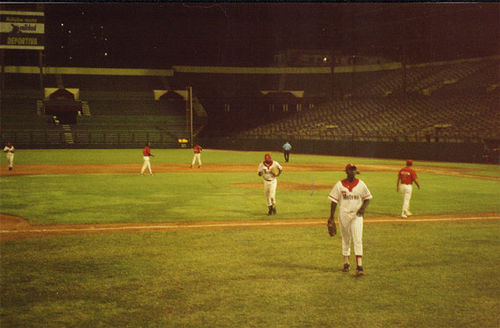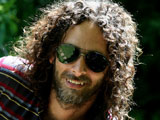Goodbye, Baseball?
by Orlando Luis Pardo Lazo and translated by Alex Higson / June 24, 2013 / No comments
Will baseball in Cuba disappear with the ideals of the Revolution?

Once a beacon of the Cuban Revolution, baseball in the country has seen its purity dissipate. Photo: Cyrus Fariva via Flickr.
The Cuban National Series for amateur baseball was one of the “jewels in the crown” of the system known as the Cuban Revolution.

- Is it worth-while to focus on the last images and letters coming from the inside of the last living utopia on Earth? Is Cuba by now a contemporary country or just another old-fashioned delusion in the middle of Nowhere-America? A Cold-War Northtalgia maybe? Can we expect a young Rewwwolution.cu within that Ancien Régime still known as The Revolution? I would like to provoke more questions than answers.

- Orlando Luis Pardo Lazo was born in Havana City and still resides and resists there, working as a free-lance writer, photographer and blogger. He is the author of Boring Home (2009) and is the editor of the independent opinion and literary e-zine Voces.
Under this system, entrance to the stadiums was free by law and, as a result, for decades not a single fan kept any of the balls that flew into the crowd. Commercial advertising—both in physical signage and via the media—was outlawed and replaced by political slogans. In addition, the players’ and umpires’ salaries were brought down to the level of the proletariat, though compared to the average man on the street they were still privileged. Baseball’s stars were given Soviet cars, as well international vacations and stays in exclusive hotels belonging to the Nomenklatura.
At the turn of the new century and millennium, just as the devastating economic crisis of the 1990s was easing, the National Series was losing its luster. A large number of sportsmen were deserting Cuba each time a competition was played overseas. As attendance dropped and police presence doubled stadiums soon became places to find bootlegged goods and fights. What’s more, during this period the Cuban officials began to charge admission. In accordance with this, the people began to keep the balls. An eye for an eye: The social pact was broken at a symbolic level.
Now, the National Institute of Sport, Physical Education, and Recreation (INDER) has permitted Michel Enríquez, 34,to play for a team in the Mexican League, making him the first ball player on the Island to be hired by a professional club: Los Piratas de Campeche. Previous exceptions had only been made after an athlete’s official retirement.
Soon very little may remain of that first championship in 1960, when there were still some players left in Cuba from the time of professional baseball, and a Rebel Army captain, Felipe Guerra Matos–the then director of sports—organized the competition according to the same logic that he’d use to command a camp of voluntary militiamen. Now, if Raul Castro’s reforms finally give the green light to an avalanche of profit-driven sport, our greatest sporting event may well turn into a fourth-rate Development League.
We’ll wait and see.




